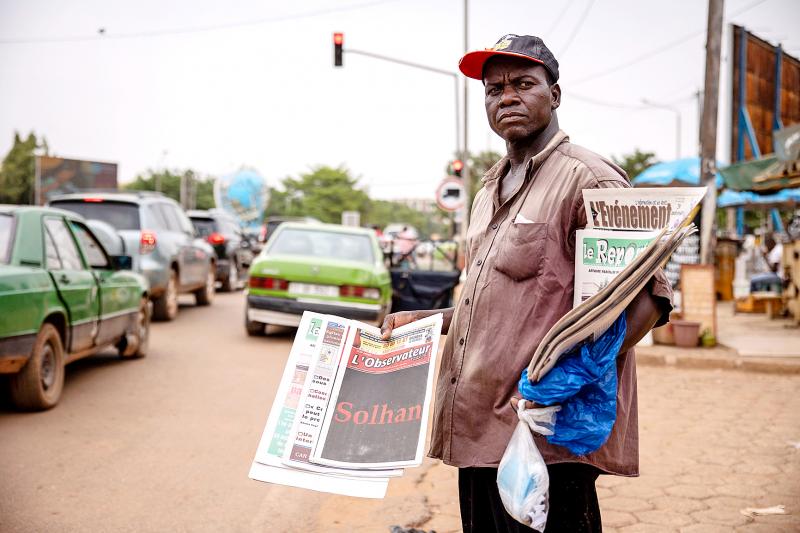Burkina Faso on Tuesday said that more than 7,000 people had fled the country’s volatile north following the bloodiest massacre in a six-year-old jihadist insurgency.
“Steps have already been taken to give [displaced people] a minimum level of comfort, lodgings and food,” Burkinabe Prime Minister Christophe Dabire said, promising on a visit to the area that the attack “will not go unpunished.”
Dabire’s advisers told reporters that 7,600 people had fled to Sebba, the capital of Yagha Province, about 15km from the scene of the attack in Solhan village.

Photo: AFP
In Geneva, Switzerland, UN High Commissioner for Refugees spokesman Babar Baloch said that more than 3,300 people had fled, including more than 2,000 children and 500 women, after gunmen stormed into Solhan on Saturday last week and killed civilians.
At least 138 men, women and children were “executed,” and nearly 40 were seriously wounded, Baloch said.
Local sources have put the death toll at least 160, marking the deadliest attack since violence erupted in the west African country in 2015.
Burkinabe Minister of Communications Ousseni Tamboura said that the village “has been completely emptied of people.”
One local elected official said that most of those who left Solhan had already been fleeing violence, including in the Mansila district to the west.
Attackers “burned almost everything, houses, the market, the school and the dispensary,” Tamboura said.
Displaced people “arrived with few or no belongings,” Baloch said, adding that most “were generously welcomed by local families who are sharing what little they have.”
The new arrivals urgently need water, sanitation, shelter and medical care, he said.

STEPPING UP: Diminished US polar science presence mean opportunities for the UK and other countries, although China or Russia might also fill that gap, a researcher said The UK’s flagship polar research vessel is to head to Antarctica next week to help advance dozens of climate change-linked science projects, as Western nations spearhead studies there while the US withdraws. The RRS Sir David Attenborough, a state-of-the-art ship named after the renowned British naturalist, would aid research on everything from “hunting underwater tsunamis” to tracking glacier melt and whale populations. Operated by the British Antarctic Survey (BAS), the country’s polar research institute, the 15,000-tonne icebreaker — boasting a helipad, and various laboratories and gadgetry — is pivotal to the UK’s efforts to assess climate change’s impact there. “The saying goes

FRUSTRATIONS: One in seven youths in China and Indonesia are unemployed, and many in the region are stuck in low-productivity jobs, the World Bank said Young people across Asia are struggling to find good jobs, with many stuck in low-productivity work that the World Bank said could strain social stability as frustrations fuel a global wave of youth-led protests. The bank highlighted a persistent gap between younger and more experienced workers across several Asian economies in a regional economic update released yesterday, noting that one in seven young people in China and Indonesia are unemployed. The share of people now vulnerable to falling into poverty is now larger than the middle class in most countries, it said. “The employment rate is generally high, but the young struggle to

ENERGY SHIFT: A report by Ember suggests it is possible for the world to wean off polluting sources of power, such as coal and gas, even as demand for electricity surges Worldwide solar and wind power generation has outpaced electricity demand this year, and for the first time on record, renewable energies combined generated more power than coal, a new analysis said. Global solar generation grew by a record 31 percent in the first half of the year, while wind generation grew 7.7 percent, according to the report by the energy think tank Ember, which was released after midnight yesterday. Solar and wind generation combined grew by more than 400 terawatt hours, which was more than the increase in overall global demand during the same period, it said. The findings suggest it is

FIRST STAGE: Hamas has agreed to release 48 Israeli hostages in exchange for 250 ‘national security prisoners’ as well as 1,700 Gazans, but has resisted calls to disarm Israel plans to destroy what remains of Hamas’ network of tunnels under Gaza, working with US approval after its hostages are freed, it said yesterday. Israeli Minister of Defense Israel Katz said that the operation would be conducted under an “international mechanism” led by the US. “Israel’s great challenge after the hostage release phase will be the destruction of all Hamas terrorist tunnels in Gaza,” Katz said. “I have ordered the army to prepare to carry out this mission,” he added. Hamas operates a network of tunnels under Gaza, allowing its fighters to operate out of sight of Israeli reconnaissance. Some have passed under